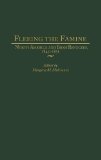

 |

|

The average rating for Fleeing the Famine: North America and Irish Refugees, 1845-1851 based on 2 reviews is 3 stars.
Review # 1 was written on 2015-02-06 00:00:00 Charles Crevier Charles CrevierWow! History as it ought to be written! Mark Zuelke writes a fast moving detailed blow by blow account of the War of 1812 and the subsequent negotiated peace treaty at Ghent, swiftly describing personalities, relationships and strategies and misteps on both sides. The account of the battles for Lake Erie and Lake Ontario kept me on the edge of my seat as did the failed campaign on Montreal and the battle for the Niagara Peninsula. The story of Laura Secord alas is not quite verifiable. (Secord's warning on Tanglefoot's album Captured Alive (IMPORT) and other of their albums is a personal favorite.) Oddly enough the War was only an echo of the Napoleonic Wars and the Americans are shown to have greater reason to grieve against the French, yet they decided to side against and attack the British. My only complaint is that the constant change of viewpoints and the sheer number of people referenced in the space of a few paragraphs made the narrative confusing and might be boring for the younger reader but the book had no problem holding my attention. There are also incredible parallels for our own time - the Raisin River massacre where the British left a group of natives to guard American prisoners; the fascinating account of how the Americans due to the advocacy of men like Henry Clay pushed the country into war that they were not prepared to fight and their mistaken notion that the Canadians would welcome their advance. There is also the lesson of a military advantage not used is no advantage at all when held by overly cautious officers such as the British Prevost and the American General Henry "Granny" Dearborn. A similar example is related when American ships which have superior canon to the British are held back by a sandbar on Lake Erie. And even though the focus of the book is on the military campaign it also records the political pressures of external concerns such as taxes and elections on the outcome of negotiations. The coverage of the peace negotiations at Ghent was a treat. I was astounded and impressed to discover that one of the primary British demands in was the formation and recognition of an Indian buffer nation in Ohio and Michigan, not only to contain American expansion and protect Upper Canada but also in respect of native support and native claims. The primary British negotiator Ghoulburn had strong feelings on that point, only to be undermined by lack of interest or obligation of its importance by Wellington who wanted the matter wrapped up as quickly as possible. North America was just a side show and wrapping up the Concert of Europe after Napoleon was the main event. Indeed Wellington's historical lustre drops by the revelation of his sending a letter to the American lead negotiator Albert Gallatin the content of which would be considered no less than treason. Canadian children learn a short version about the War in middle school, though I remember learning more than my children were exposed to. American children seem to know nothing at all. This book is too old for them. I'd certainly recommend it to history teachers, upper year college students, history buffs or those with an interest in military strategy. Be warned though - this is not a skimmable book - each paragraph is loaded with six or eight people and rapidly changing points of view so it can be hard to follow but Zuehlke ties it all together. Fascinating and Recommended. |
Review # 2 was written on 2019-11-17 00:00:00 Edward Trout Edward TroutI had read numerous books on WW2 by Mark and was to be blunt, surprised that he would leave what I thought was his comfort zone and take on the war of 1812. For me 1812 was a deciding point for Canada. Would we remain British or become another state in the USA or not? Loyalist's or Tories as they were called; were not treated well after the American War of Independence. Many fled to Atlantic Canada. Others to Quebec ( lower Canada ) and the Eastern Townships while other to Upper Canada ( Ontario ). All to start over again. Having to clear away forests and plant their crops amongst the stumps. It was not an easy choice and having left their comforts and lost nearly everything they had. Then in 1812 while Britain was tied up in Europe with Napoleon a new war. In reality it was a civil war as most of the new Colonists / Loyalists were being forced to make a call to fight against their previous neighbours. It was an expensive war and one that should never have happened. It could not be afforded and through major blunders on both sides was costing everyone too much to be continued. How to end it however was a question. In Europe a group of Diplomats ( American and British )tried to figure out how to bring about an acceptable peace treaty to end a war and yet have both sides save face. It is very interesting to see how they worked on this and how we Canadians are still living with some of the decisions made in 1814 by these 8 gentlemen. Their points of view and hidden agendas and personalities all make for interesting views. This was not what I had expected and it was a complete surprise for me. Mark carried this off and it certainly made a whole gap in my knowledge of our North American History. Please do read. |
CAN'T FIND WHAT YOU'RE LOOKING FOR? CLICK HERE!!!